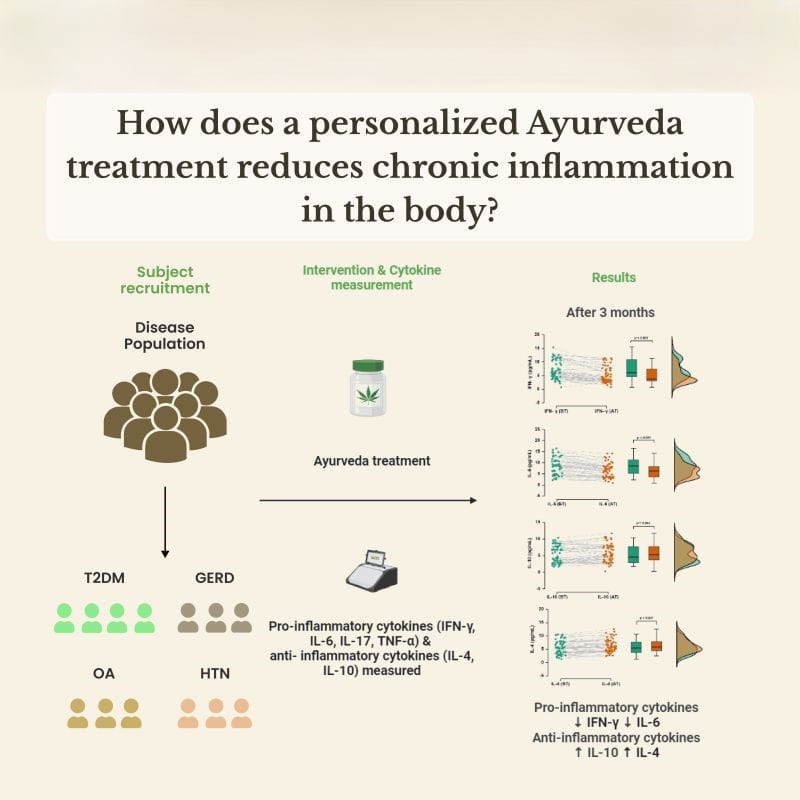Introduction
Chronic inflammation is the root cause of many diseases, including arthritis, heart disease, and autoimmune disorders. Ayurvedic treatment for inflammation focuses on balancing the Pitta dosha, which Ayurveda defines as the main cause of excessive heat, swelling, and discomfort in the body. By incorporating Ayurvedic herbs, dietary changes, and detoxification methods, you can effectively manage inflammation and restore balance to your body.
In this guide, explore how Ayurveda treats chronic inflammation with time-tested remedies and holistic practices.
1. Ayurvedic Perspective on Chronic Inflammation
Ayurveda classifies inflammation as an aggravated Pitta dosha condition, often caused by:
- Poor digestion and toxin buildup (Ama accumulation)
- Excessive stress and mental strain
- Overconsumption of spicy, fried, or processed foods
- Environmental toxins and lifestyle factors
Signs of Chronic Inflammation in Ayurveda:
- Joint pain and stiffness (Arthritis symptoms)
- Skin conditions like eczema and psoriasis
- Digestive issues such as acid reflux and bloating
- Fatigue, brain fog, and mood swings
2. Ayurvedic Remedies for Inflammation
Ayurveda offers natural anti-inflammatory treatments to balance Pitta and detoxify the body. Some of the most effective remedies include:
1. Best Ayurvedic Herbs for Inflammation
- Turmeric (Curcumin) – A powerful natural anti-inflammatory that reduces swelling and joint pain.
- Ashwagandha – Helps combat stress-related inflammation and boosts immunity.
- Guduchi (Tinospora Cordifolia) – Detoxifies the body and enhances liver function.
- Amla (Indian Gooseberry) – Rich in vitamin C, supports digestion and strengthens immunity.
- Boswellia (Shallaki) – Reduces pain and stiffness in arthritis patients.
2. Anti-Inflammatory Ayurvedic Diet
A Pitta-pacifying diet is essential to control inflammation. Follow these dietary tips:
- Eat cooling and alkaline foods such as leafy greens, cucumbers, and coconut.
- Avoid spicy, sour, and fermented foods that aggravate Pitta.
- Include healthy fats like ghee and sesame oil for lubrication and joint health.
- Stay hydrated with herbal teas like chamomile and licorice tea.
3. Ayurvedic Detoxification (Panchakarma)
Panchakarma therapy is a deep cleansing technique that removes toxins and reduces inflammation.
- Virechana (Therapeutic Purgation) – Helps cleanse the liver and digestive tract.
- Abhyanga (Oil Massage) – Uses warm medicated oils to soothe muscles and improve circulation.
- Basti (Herbal Enema) – Removes toxins and balances Vata and Pitta doshas.
3. Ayurvedic Lifestyle Tips for Managing Inflammation
1. Stress Management
- Practice Yoga for inflammation – Gentle poses like Viparita Karani (Legs Up the Wall Pose) and Balasana (Child’s Pose) help reduce stress.
- Meditate daily to calm the nervous system and lower cortisol levels.
- Maintain a consistent sleep schedule to allow the body to heal naturally.
2. Daily Ayurvedic Practices
- Tongue scraping – Removes toxins that contribute to inflammation.
- Oil pulling with coconut or sesame oil – Reduces oral bacteria and systemic inflammation.
- Hydration with warm lemon water – Supports digestion and detoxification. Ayurvedic Practices for Optimal Hydration and Skin Radiance
4. Scientific Studies & Ayurvedic References
Ayurvedic texts such as Charaka Samhita and Sushruta Samhita emphasize the role of diet, herbs, and detox therapies in controlling inflammation. Scientific research also supports Ayurvedic treatments for inflammatory conditions.

Conclusion
Chronic inflammation can lead to serious health problems if left unchecked. Ayurvedic treatment for inflammation provides a holistic healing approach to combat inflammation naturally through diet, herbs, detoxification, and lifestyle changes. By adopting Ayurvedic practices, you can achieve long-term wellness and prevent inflammation-related diseases.
Start your Ayurvedic journey to reduce chronic inflammation today! Learn more about Ayurvedic remedies and holistic healing at ResearchGate.
